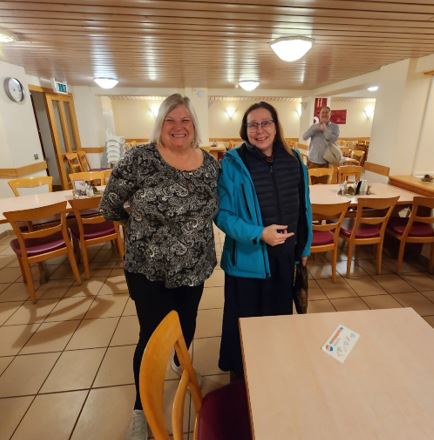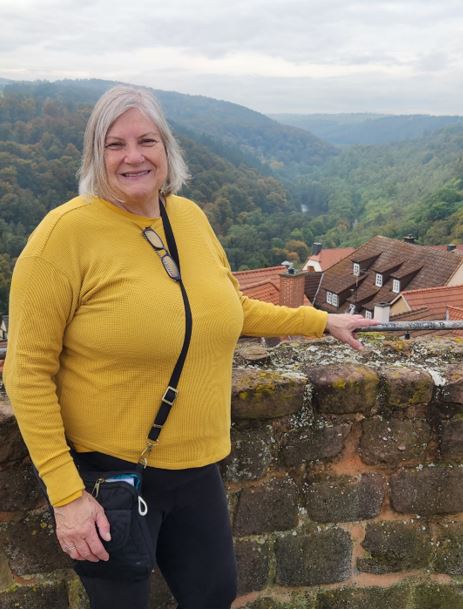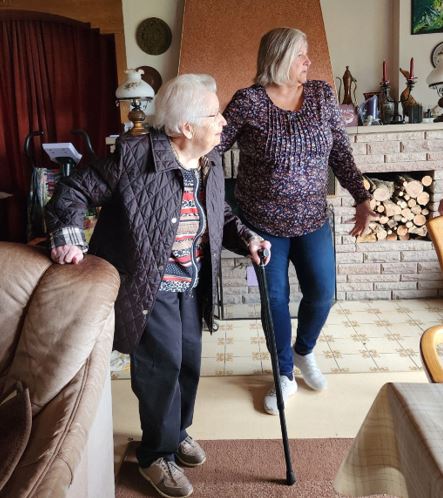
I’m back from my travels to France and Germany where I spent a week researching my husband and my ancestry in the Alsace-Lorraine region. I’m going to conclude my October series on synchronicity with another weird encounter that happened to me in a castle.
A little back story is needed to fully appreciate this odd encounter…
I’ve always known I was part German. My maiden name was Leininger so it was a no brainer figuring the ethnicity out. However, names alone don’t tell the whole story and the region from where my German ancestors once lived was fraught with turmoil for generations. I recently learned that some of it was from within the community – noble vs. peasants, but it also occurred with outsiders invading, such as during the 30 year war and Napoleon.
My paternal side never spoke about their heritage. Perhaps because it was too painful to recall or because they just weren’t great communicators. When my first child was born I asked my dad for genealogical info to put in the baby book and got the response, “When I’m dead, you’ll get the book.” My response, “Book, what book? Why do I have to wait ‘til your dead?”
He then informed me that he had two books that had been written by a family member about the Leiningers, which were also once known as Leiningen, and didn’t want to give me the books as he still referred to them occasionally. Like I wrote earlier, not great communicators!
Unfortunately, I didn’t get the books when he died as my stepmother refused to give them to me. I offered to pay for her time packing them and shipping but she said she didn’t have the time to do it. I turned to the internet and did receive an electronic copy of the first book from the author who was stationed in Germany at the time. Five years after my father’s death, when I stopped at my stepmother’s home after burying my mother, she produced the books and several photo albums.
The genealogies were not sourced and had a lot of errors. In fact, the second book was basically a fix it for the first as so many relatives had written to correct the wrong info. I used the book to do a surname study through “My Main Tree” on Ancestry.com as there were several lines mentioned that didn’t connect. This was before DNA.
I was not in contact with any close family members as it wasn’t a family that maintained ties. I don’t read or write German and with work, family, and other commitments, put the German research aside. Someday, I thought, I’d go back to it.
Someday became a year ago in June when I made a post on Whova, a conference app, asking if anyone had any info about the following surnames: Bollenbacher, Harbaugh, Kable, Kettering, Kuhn, Leininger, Mahler. One man from Germany responded and I’ve blogged about his help previously here and here.
Gerhard was the first family member I ever met on any of those surnames outside of my dad, grandfather, two aunts and three first cousins who were Leiningers. There are pictures of me with a great aunt but I don’t recall much as I was just 3 when the visit occurred.
Gerhard introduced me to two other conference attendees that were Kettingers. None of us were close (7th cousins). While doing research last spring in Germany, Gerhard happened to meet a 96 year old woman named Irma who was providing Gerhard with an oral history of her town, Bedesbach. Gerhard noticed a photo on the wall in her living room and inquired about it. She told Gerhard it was taken in the 1980s when she had attended a Bollenbacher family reunion in northeastern Indiana. Gerhard told her about me as he had looked at my tree and knew I was descended from the Bollenbachers. She asked him to get in touch with me and check on people she had visited in Indiana. I blogged about that meeting here.
Something told me it was time to visit the Palatinate and see what I could find about my ancestors’ lives there. With Gerhard’s help after reviewing the little info I had found about them, my husband and I traveled to Frankfurt and then by car to the region of interest.

Within an hour and a half of landing, I was taken to what had once been a castle of a noble Leiningen. That’s me at the top and I do have a story to share but am saving that for another time. Rita, a friend of Gerhard’s what was accompanying us, told me that the next castle from the Leiningens were the Frankensteins, of Mary Shelley fame. One of them had been an alchemist. Perfect family info to learn on a fall October day!
Gerhard had a surprise for me every day and I’ll be blogging about the hints and tricks that I learned in researching this area beginning next week.
The creepy part of the story, however, occurred on a Saturday night. Gerhard took us to a castle that supposedly was not associated with my family. We were going to have dinner with a group of attendees at a genealogical conference that was being held there that weekend. Another genealogist that I have worked with, Roland Geiger, was putting the conference on and thought it would be a good idea if we stopped by.
Remember, I don’t read, speak or UNDERSTAND much German but I wanted to see Roland so I was game. There were six chairs at each table in the dining room. Gerhard, Rita, my husband, Roland, and I took five of the seats. An attendee decided to join us. We had a nice dinner and then moved up to the bar area where more mingling was to occur. The tables there only sat four so Gerhard, Rita, my husband and I filled up a table. The woman that had joined us at dinner had some questions for me about genealogy practices so we pulled up another chair. On her iPad she brought up her Wiki Tree. I told her I don’t use that because my tree is too large to upload to them and I don’t have time to do it piecemeal. She explained that she prefers Wiki Tree to other companies because of the sources that are found on the trees. I can’t disagree with her but I wanted to show her how well sourced my Ancestry.com tree was. She brought it up on her iPad. I showed her my dad and grandfather’s info, then decided to show her the pedigree view. That’s when it got creepy.
Alesandra-Brigitte became very quiet and just stared at the tree. I encouraged her to click on any of the names to see the details. She blinked, looked at me seriously and said, “I’m a Bollenbacher, too.”
In seconds, we discovered we are 6th cousins. I told her I would be meeting another 6th cousin who was 96 the next day for lunch. She had no knowledge of the other woman who lived close to her.

So, by just dropping by for dinner at a castle in the middle of nowhere I connected with a distant family member who I was able to help connect with another family member that lived close to her. Simply amazing!
I only regret that I didn’t have more time to talk to other attendees as I suspect I was related to most of them.
Genealogy is both weird and wonderful! On this Halloween, I hope the spirits enable you to make some meaningful family connections.

